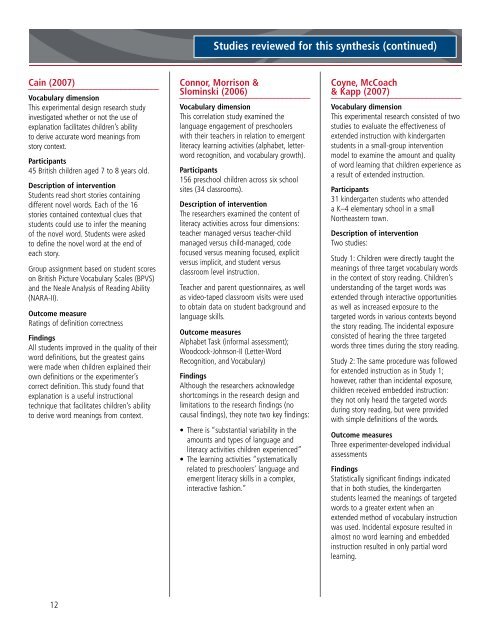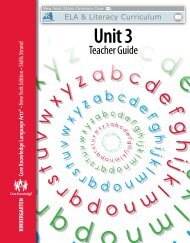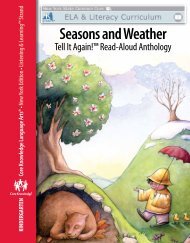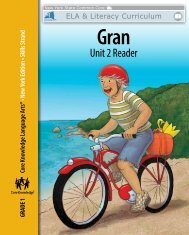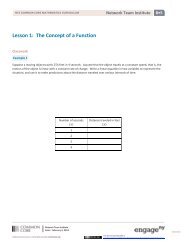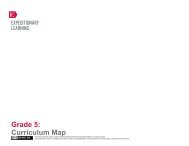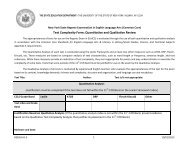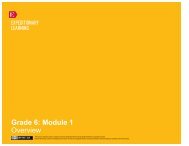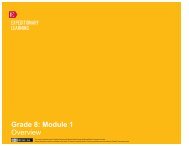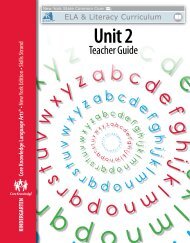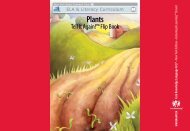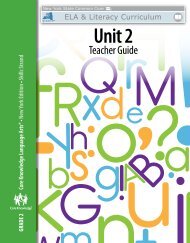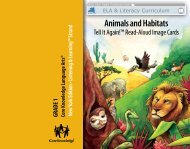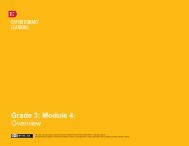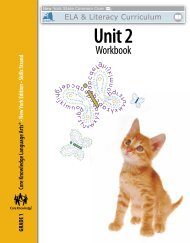A Review of the Current Research on Vocabulary Instruction - U.S. ...
A Review of the Current Research on Vocabulary Instruction - U.S. ...
A Review of the Current Research on Vocabulary Instruction - U.S. ...
Create successful ePaper yourself
Turn your PDF publications into a flip-book with our unique Google optimized e-Paper software.
Studies reviewed for this syn<str<strong>on</strong>g>the</str<strong>on</strong>g>sis (c<strong>on</strong>tinued) Appendix<br />
Cain (2007)<br />
<strong>Vocabulary</strong> dimensi<strong>on</strong><br />
This experimental design research study<br />
investigated whe<str<strong>on</strong>g>the</str<strong>on</strong>g>r or not <str<strong>on</strong>g>the</str<strong>on</strong>g> use <str<strong>on</strong>g>of</str<strong>on</strong>g><br />
explanati<strong>on</strong> facilitates children’s ability<br />
to derive accurate word meanings from<br />
story c<strong>on</strong>text.<br />
Participants<br />
45 British children aged 7 to 8 years old.<br />
Descripti<strong>on</strong> <str<strong>on</strong>g>of</str<strong>on</strong>g> interventi<strong>on</strong><br />
Students read short stories c<strong>on</strong>taining<br />
different novel words. Each <str<strong>on</strong>g>of</str<strong>on</strong>g> <str<strong>on</strong>g>the</str<strong>on</strong>g> 16<br />
stories c<strong>on</strong>tained c<strong>on</strong>textual clues that<br />
students could use to infer <str<strong>on</strong>g>the</str<strong>on</strong>g> meaning<br />
<str<strong>on</strong>g>of</str<strong>on</strong>g> <str<strong>on</strong>g>the</str<strong>on</strong>g> novel word. Students were asked<br />
to define <str<strong>on</strong>g>the</str<strong>on</strong>g> novel word at <str<strong>on</strong>g>the</str<strong>on</strong>g> end <str<strong>on</strong>g>of</str<strong>on</strong>g><br />
each story.<br />
Group assignment based <strong>on</strong> student scores<br />
<strong>on</strong> British Picture <strong>Vocabulary</strong> Scales (BPVS)<br />
and <str<strong>on</strong>g>the</str<strong>on</strong>g> Neale Analysis <str<strong>on</strong>g>of</str<strong>on</strong>g> Reading Ability<br />
(NARA-II).<br />
Outcome measure<br />
Ratings <str<strong>on</strong>g>of</str<strong>on</strong>g> definiti<strong>on</strong> correctness<br />
Findings<br />
All students improved in <str<strong>on</strong>g>the</str<strong>on</strong>g> quality <str<strong>on</strong>g>of</str<strong>on</strong>g> <str<strong>on</strong>g>the</str<strong>on</strong>g>ir<br />
word definiti<strong>on</strong>s, but <str<strong>on</strong>g>the</str<strong>on</strong>g> greatest gains<br />
were made when children explained <str<strong>on</strong>g>the</str<strong>on</strong>g>ir<br />
own definiti<strong>on</strong>s or <str<strong>on</strong>g>the</str<strong>on</strong>g> experimenter’s<br />
correct definiti<strong>on</strong>. This study found that<br />
explanati<strong>on</strong> is a useful instructi<strong>on</strong>al<br />
technique that facilitates children’s ability<br />
to derive word meanings from c<strong>on</strong>text.<br />
C<strong>on</strong>nor, Morris<strong>on</strong> &<br />
Slominski (2006)<br />
<strong>Vocabulary</strong> dimensi<strong>on</strong><br />
This correlati<strong>on</strong> study examined <str<strong>on</strong>g>the</str<strong>on</strong>g><br />
language engagement <str<strong>on</strong>g>of</str<strong>on</strong>g> preschoolers<br />
with <str<strong>on</strong>g>the</str<strong>on</strong>g>ir teachers in relati<strong>on</strong> to emergent<br />
literacy learning activities (alphabet, letterword<br />
recogniti<strong>on</strong>, and vocabulary growth).<br />
Participants<br />
156 preschool children across six school<br />
sites (34 classrooms).<br />
Descripti<strong>on</strong> <str<strong>on</strong>g>of</str<strong>on</strong>g> interventi<strong>on</strong><br />
The researchers examined <str<strong>on</strong>g>the</str<strong>on</strong>g> c<strong>on</strong>tent <str<strong>on</strong>g>of</str<strong>on</strong>g><br />
literacy activities across four dimensi<strong>on</strong>s:<br />
teacher managed versus teacher-child<br />
managed versus child-managed, code<br />
focused versus meaning focused, explicit<br />
versus implicit, and student versus<br />
classroom level instructi<strong>on</strong>.<br />
Teacher and parent questi<strong>on</strong>naires, as well<br />
as video-taped classroom visits were used<br />
to obtain data <strong>on</strong> student background and<br />
language skills.<br />
Outcome measures<br />
Alphabet Task (informal assessment);<br />
Woodcock-Johns<strong>on</strong>-II (Letter-Word<br />
Recogniti<strong>on</strong>, and <strong>Vocabulary</strong>)<br />
Findings<br />
Although <str<strong>on</strong>g>the</str<strong>on</strong>g> researchers acknowledge<br />
shortcomings in <str<strong>on</strong>g>the</str<strong>on</strong>g> research design and<br />
limitati<strong>on</strong>s to <str<strong>on</strong>g>the</str<strong>on</strong>g> research findings (no<br />
causal findings), <str<strong>on</strong>g>the</str<strong>on</strong>g>y note two key findings:<br />
• There is “substantial variability in <str<strong>on</strong>g>the</str<strong>on</strong>g><br />
amounts and types <str<strong>on</strong>g>of</str<strong>on</strong>g> language and<br />
literacy activities children experienced”<br />
• The learning activities “systematically<br />
related to preschoolers’ language and<br />
emergent literacy skills in a complex,<br />
interactive fashi<strong>on</strong>.”<br />
Coyne, McCoach<br />
& Kapp (2007)<br />
<strong>Vocabulary</strong> dimensi<strong>on</strong><br />
This experimental research c<strong>on</strong>sisted <str<strong>on</strong>g>of</str<strong>on</strong>g> two<br />
studies to evaluate <str<strong>on</strong>g>the</str<strong>on</strong>g> effectiveness <str<strong>on</strong>g>of</str<strong>on</strong>g><br />
extended instructi<strong>on</strong> with kindergarten<br />
students in a small-group interventi<strong>on</strong><br />
model to examine <str<strong>on</strong>g>the</str<strong>on</strong>g> amount and quality<br />
<str<strong>on</strong>g>of</str<strong>on</strong>g> word learning that children experience as<br />
a result <str<strong>on</strong>g>of</str<strong>on</strong>g> extended instructi<strong>on</strong>.<br />
Participants<br />
31 kindergarten students who attended<br />
a K–4 elementary school in a small<br />
Nor<str<strong>on</strong>g>the</str<strong>on</strong>g>astern town.<br />
Descripti<strong>on</strong> <str<strong>on</strong>g>of</str<strong>on</strong>g> interventi<strong>on</strong><br />
Two studies:<br />
Study 1: Children were directly taught <str<strong>on</strong>g>the</str<strong>on</strong>g><br />
meanings <str<strong>on</strong>g>of</str<strong>on</strong>g> three target vocabulary words<br />
in <str<strong>on</strong>g>the</str<strong>on</strong>g> c<strong>on</strong>text <str<strong>on</strong>g>of</str<strong>on</strong>g> story reading. Children’s<br />
understanding <str<strong>on</strong>g>of</str<strong>on</strong>g> <str<strong>on</strong>g>the</str<strong>on</strong>g> target words was<br />
extended through interactive opportunities<br />
as well as increased exposure to <str<strong>on</strong>g>the</str<strong>on</strong>g><br />
targeted words in various c<strong>on</strong>texts bey<strong>on</strong>d<br />
<str<strong>on</strong>g>the</str<strong>on</strong>g> story reading. The incidental exposure<br />
c<strong>on</strong>sisted <str<strong>on</strong>g>of</str<strong>on</strong>g> hearing <str<strong>on</strong>g>the</str<strong>on</strong>g> three targeted<br />
words three times during <str<strong>on</strong>g>the</str<strong>on</strong>g> story reading.<br />
Study 2: The same procedure was followed<br />
for extended instructi<strong>on</strong> as in Study 1;<br />
however, ra<str<strong>on</strong>g>the</str<strong>on</strong>g>r than incidental exposure,<br />
children received embedded instructi<strong>on</strong>:<br />
<str<strong>on</strong>g>the</str<strong>on</strong>g>y not <strong>on</strong>ly heard <str<strong>on</strong>g>the</str<strong>on</strong>g> targeted words<br />
during story reading, but were provided<br />
with simple definiti<strong>on</strong>s <str<strong>on</strong>g>of</str<strong>on</strong>g> <str<strong>on</strong>g>the</str<strong>on</strong>g> words.<br />
Outcome measures<br />
Three experimenter-developed individual<br />
assessments<br />
Findings<br />
Statistically significant findings indicated<br />
that in both studies, <str<strong>on</strong>g>the</str<strong>on</strong>g> kindergarten<br />
students learned <str<strong>on</strong>g>the</str<strong>on</strong>g> meanings <str<strong>on</strong>g>of</str<strong>on</strong>g> targeted<br />
words to a greater extent when an<br />
extended method <str<strong>on</strong>g>of</str<strong>on</strong>g> vocabulary instructi<strong>on</strong><br />
was used. Incidental exposure resulted in<br />
almost no word learning and embedded<br />
instructi<strong>on</strong> resulted in <strong>on</strong>ly partial word<br />
learning.<br />
12


